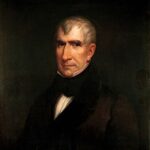The Fatal Decision on Inauguration Day
On March 4, 1841, William Henry Harrison made a deadly choice. Despite freezing temperatures and bitter wind, he refused winter clothing for his inauguration. The Harrison inaugural address lasted an unprecedented 105 minutes in harsh conditions. 🥶 Harrison wanted to prove his vigor at age 68. He rejected a coat, hat, and gloves while delivering 8,445 words. Rain soaked through his clothes as temperatures hovered near freezing. Advisors urged him to shorten the speech or dress warmly. Harrison dismissed their concerns about his health.
Historical Context of the Marathon Speech
Harrison faced criticism about his age and mental capacity during the 1840 campaign. Political opponents called him too old and feeble for presidential duties. The lengthy Harrison inaugural address aimed to silence these doubts permanently. 📊 His speech covered foreign policy, domestic issues, and constitutional principles. Harrison spent weeks crafting every word to demonstrate his intellectual prowess. The address became the longest in American presidential history.
Immediate Health Consequences
Within days of the inauguration, Harrison developed cold symptoms. His condition rapidly deteriorated into what doctors diagnosed as pneumonia. ⚠️ The president never recovered from his inauguration day exposure. Medical experts of the era directly linked his illness to the harsh weather conditions. Harrison died exactly 31 days after taking office, becoming America’s shortest-serving president.
Impact:
Constitutional Crisis and Succession Uncertainty
Harrison’s death created America’s first presidential succession crisis. The Constitution remained unclear about vice presidential powers after a president’s death. 🔥 John Tyler assumed the presidency, but many questioned his legitimate authority. Some called Tyler merely an “Acting President” without full executive powers. Congress debated whether Tyler could serve a complete term or needed special elections. This constitutional ambiguity lasted for decades until formal amendments clarified succession rules.
Political Party Disruption and Policy Chaos
The Whig Party lost their carefully planned political agenda with Harrison’s sudden death. Tyler quickly broke with Whig leadership on major policy issues. 📉 The Harrison inaugural address had promised specific legislative priorities that never materialized. Banking reforms, internal improvements, and tariff changes stalled completely. Tyler’s presidency became known as “His Accidency” due to constant political conflicts. The Whig Party eventually expelled Tyler from their ranks entirely.
Long-term Presidential Health Precedents
Harrison’s death established important precedents for presidential health and safety protocols. Future presidents adopted more cautious approaches to public appearances in harsh weather. 🌍 The incident highlighted how personal decisions could affect national governance and stability. Medical advisors became standard members of presidential staff after this tragedy. The fatal Harrison inaugural address demonstrated that presidential image concerns could have deadly national consequences.
